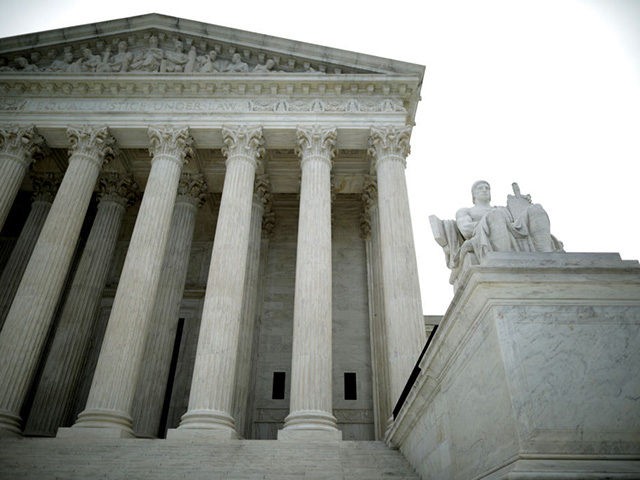The Supreme Court said it would settle immigration-related disputes over President Donald Trump’s border wall and the Migrant Protection Protocols (MPP), which replaced the catch-and-release policies that allowed hundreds of thousands of economic migrants into blue-collar jobs.
The decision was announced Monday, October 19.
The announcement follows the court’s October 16 announcement that it will quickly rule on the legality of Trump’s plan to exclude illegal migrants from the once-a-decade, census-based process of allocating seats in the House of Representatives to the various large and small states.
The court will hear the census dispute on November 20, perhaps allowing Trump to transfer a few seats from states that use large numbers of low-wage migrants to boost their local businesses.
Amy Coney Barrett is on track to join the court before the cases are heard.
The border-wall case is about the legality of Trump’s claim that his emergency powers allow him to transfer funds from projects approved by Congress to wall-construction programs. On October 10, judges in the Ninth Circuit Court of Appeals declared that a transfer is illegal, in a case brought by the American Civil Liberties Union (ACLU).
“Construction [of the wall] is moving at a rate of approximately 10 miles per week, setting the administration up to complete its year-end goal with time to spare,” said a September 29 statement from the White House.
The MPP program was created by the United States and Mexico to help stop the flow of hundreds of thousands of migrants through Mexico and the U.S. border.
The flow is made legally possible because coyotes and pro-migration lawyers guide migrants through quirks in the law that were created by Congress and then widened by pro-migration judges.
The MPP program now blocks some of the loopholes by sending migrants back to Mexico, pending an eventual asylum-claim hearing in U.S. courts. This return denies the migrants the American jobs they need to pay off their debts to the cartel-tied coyotes, and so breaks the coyotes’ business model of smuggling people for profit.
Many pro-migration advocates hate the MPP program because it has largely shut down the Latin American migration that has caused much crime and economic damage in Latin America and in the United States. “The MPP is pure evil,” tweeted an ACLU lawyer. “It’s essentially a rendition program that delivers asylum seekers to Mexico, where criminal gangs are standing by to persecute them,” said lawyer Matthew Segal.
Immigration lawyers have yet to suggest alternative policies that would balance the public’s willingness to provide asylum with the public’s worry that current asylum rules are being gamed by many migrants.
Open-ended legal migration is praised by business and progressives, partly because migrants usually flood the labor market and help to transfer wealth from wage-earners to stockholders.
Migration moves money from employees to employers, from families to investors, from young to old, from homebuyers to real estate investors, and from the central states to the coastal states.
Migration allows investors and CEOs to skimp on labor-saving technology, sideline U.S. minorities, disregard workplace discrimination rules, ignore disabled people, exploit stoop labor in the fields, short-change labor in the cities, impose tight control on American professionals, centralize technological innovation, and undermine many types of labor rights.
‘”If Biden wins, he will reverse both of Trump’s policies, rendering these cases moot, and SCOTUS will presumably dismiss them,” said a hopeful tweet from a pro-migration writer at Slate.com.
Immigration polls are consistent; Americans are willing to welcome migrants – but much prefer that all Americans get good jobs & secure borders first.
Also; 1-in-4 'liberals' (vs 1-in-7 Consvtvs) favor CEOs hiring low-wage migrants before Americans. #H1Bhttps://t.co/gHcnpK3CM1— Neil Munro (@NeilMunroDC) October 18, 2020

COMMENTS
Please let us know if you're having issues with commenting.